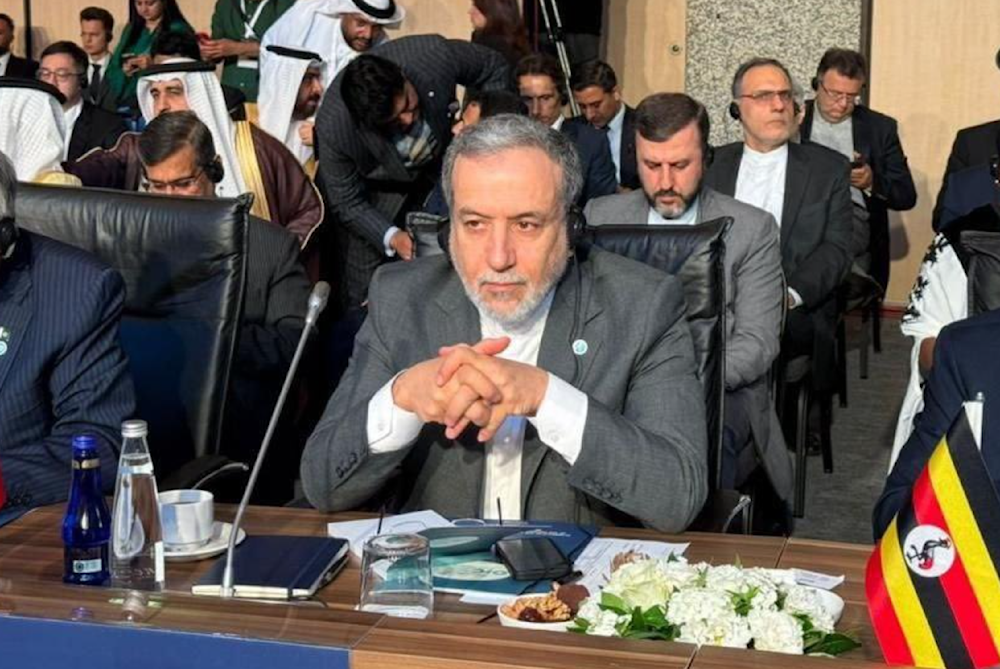Araghchi criticizes EU's remarks on Iran nuclear talks
Iran’s Foreign Minister Abbas Araghchi rebukes EU official Kaja Kallas for calling to end Iran’s nuclear program, warning her stance violates the NPT and undermines future negotiations.
-

Iranian Foreign Minister Abbas Araghchi during a meeting of the Organisation of Islamic Cooperation's (OIC) 51st session of the Council of Foreign Ministers on June 21, 2025 (Social media)
Iran’s Foreign Minister Abbas Araghchi has sharply criticized recent comments by European Commission Vice President and JCPOA Joint Commission Coordinator Kaja Kallas, accusing her of disregarding key international agreements.
Kallas suggested in a social media post that upcoming negotiations should aim to “end Iran’s nuclear program.” Araghchi responded that such a stance runs counter to the Nuclear Non-Proliferation Treaty (NPT), which "which explicitly affirm the right of all signatories to develop, research, and use nuclear technology for peaceful purposes."
In a post on X (formerly Twitter), Araghchi wrote:
If the Coordinator of the JCPOA Joint Commission believes that the objective of any potential negotiation is "ending Iran’s nuclear program", it means that:
— Seyed Abbas Araghchi (@araghchi) July 2, 2025
- EU High Representative @kajakallas disregards the provisions of the NPT, which explicitly affirm the right of all… pic.twitter.com/akv70zHfKp
The foreign minister added that "The provisions of UN Security Council Resolution 2231 and the JCPOA no longer hold any validity for its official Coordinator, thereby rendering the so-called snapback mechanism baseless."
He further contended that if the EU's Coordinator dismisses these established frameworks, the role of the European Union, its member states, and the UK in any future negotiations risk becoming redundant.
G7 calls on Iran against uranium enrichment
The G7 foreign ministers issued a joint statement urging both "Israel" and Iran to adhere to the ceasefire, while also calling on Tehran to avoid engaging in what they described as "unjustified enrichment activities."
"We reaffirm that the Islamic Republic of Iran can never have nuclear weapons, and urge Iran to refrain from reconstituting its unjustified enrichment activities," the statement published on Monday said.
The statement added, "We call for the resumption of negotiations, resulting in a comprehensive, verifiable and durable agreement that addresses Iran’s nuclear program. In order to have a sustainable and credible resolution, we call on Iran to urgently resume full cooperation with the International Atomic Energy Agency."
The ministers also urged Iran and "Israel" to avoid any actions that might escalate tensions or destabilize the region, while emphasizing the importance of upholding the ceasefire.
The G7's calls come as Iran recovers from a 12-day aggression launched by "Israel", under the guise of dismantling Iran's nuclear program.
Pezeshkian slams IAEA double standards
During a phone call with French President Emmanuel Macron on June 29, Iranian President Masoud Pezeshkian emphasized that Iran's decision to halt cooperation with the IAEA was driven by what he described as "false reports" from IAEA Director General Rafael Grossi regarding Iran’s nuclear program, as well as Grossi’s refusal to denounce the Israeli attacks targeting Iran’s nuclear facilities.
Pezeshkian condemned what he described as the international community’s double standards, arguing that while Iran’s peaceful nuclear program faces scrutiny, the Israeli occupation entity’s undeclared nuclear weapons program goes unchallenged.
The Iranian president stressed that all of Iran’s nuclear activities are conducted under IAEA oversight, despite what he described as ongoing attacks on the country’s nuclear facilities by the US and "Israel," while also pointing out that "Israel" remains outside the Treaty on the Non-Proliferation of Nuclear Weapons (NPT) and has repeatedly flouted international norms.
He further voiced apprehension about the IAEA's recent actions, arguing that they erode Iranian public confidence in the agency, while emphasizing that rebuilding this trust would necessitate the IAEA's strict adherence to its statutory rules and mandated responsibilities.
Pezeshkian raised doubts about whether Iran could receive credible guarantees for the security of its nuclear sites against potential future assaults, particularly given its continued engagement and collaboration with the IAEA.

 4 Min Read
4 Min Read










